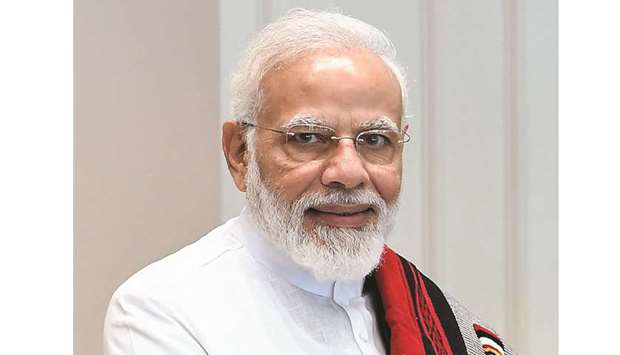India’s prime minister promised peace and development for Jammu and Kashmir yesterday, during his first public event in the region since it imposed a sweeping security clampdown nearly three years ago.
Narenda Modi’s Hindu nationalist government has sought to quell a long-running insurgency in Kashmir.
India nullified the area’s limited autonomy in August 2019, when authorities arrested thousands and imposed the world’s longest Internet shutdown, seeking to forestall local opposition to the move.
Tight security was in place for Modi’s appearance at Palli village in Jammu, the Hindu-majority southern part of the territory, which celebrated New Delhi’s introduction of direct rule as a defence against Kashmir’s separatist movement.
As Modi laid the foundation stones for the 850MW Ratle hydroelectric project and a 540MW Kwar hydroelectric project to be constructed on the Chenab river in Kishtwar district, he told the gathered crowd of thousands that his government had put the restive region on the path to prosperity.
“I want to tell the youth of the valley that they will not have to face the difficulties and travails that their parents and grandparents had to deal with,” Modi said.
In a statement, the Prime Minister’s Office (PMO) said, “Since the introduction of constitutional reforms with regards to Jammu and Kashmir in August 2019, the government has been focused on bringing about wide-ranging reforms to substantially improve governance and enhance ease of living for the people of the region at an unprecedented pace… The projects inaugurated and whose foundation stone were laid in this visit will go a long way in facilitating provision of basic amenities, ensuring ease of mobility and development of infrastructure in the region.”
Yesterday’s event marked Panchayati Raj, a day that commemorates grassroots democracy — although Kashmir has been without an elected regional government since 2018.
Its last chief minister was detained during the clampdown and only released more than a year later.
Modi’s government has long said its decision to end Kashmir’s limited autonomy was aimed at fostering a lasting peace and bringing investment into the troubled region, where tens of thousands of people have been killed over the years.
Police say violence has declined since Kashmir’s status was changed, but almost 1,000 people have been killed since 2019 — among them soldiers, militants and civilians.

Narenda Modi
